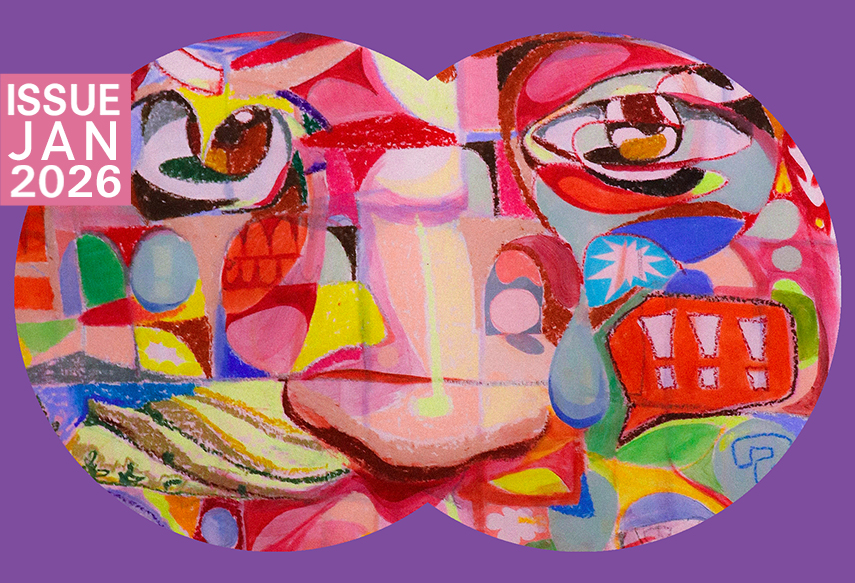- Featuring
- Sanmao
- Søren R. Fauth
- Hélène Laurain
- Eduardo Halfon
- Anatoly Loginov
- Hamid Ismailov and Wang Guanglin
As authoritarianism continues to take hold across the world, writers and translators are compelled to revisit an age-old question: What might art offer in response? Perhaps not answers, but something quieter and more resilient—a reminder of shared human frailty, and of the possibility that our “flow of being,” as Anatoly Loginov writes, might arrive at a “narrow neck” where attention itself becomes an existential force. Writing in our Winter 2026 Issue, which also marks Asymptote’s fifteenth anniversary, Loginov turns to a literary and philosophical tradition that seeks “not mastery over an object, but communion with it, even if that communion burns.” For this second of our two issues devoted to attention, we bring together his tour de force essay with a luminous travelogue by the beloved Taiwanese writer Sanmao, an excerpt from Guatemalan author Eduardo Halfon’s prizewinning Tarantula, an exclusive interview with Uzbek novelist Hamid Ismailov, a quietly devastating story by Italian master Dino Buzzati, and new translations of Milo De Angelis by Lawrence Venuti, alongside never-before-published work from 32 countries. All of it is illustrated by our talented Dublin-based guest artist Yosef Phelan.
“Gotta somehow try and see the beauty / in all of this shit.” That line, lifted from Hélène Laurain’s On Fire, sets the tonal pitch for the second installment of our Special Feature on attention. In Laurain’s incendiary excerpt, a French activist reckons with the aftermath of sabotaging a nuclear waste site, her memories of solidarity and warmth flickering against the numbing effects of police surveillance and enforced isolation. Less volatile but no less searching, the poetry of Amsterdam-based writer Daniel Carden Nemo dissolves the boundary between subject and object, quietly reminding us that to observe is already to participate, and therefore to choose. Hanaka’s sumptuous poem, rooted in a Kyoto festival, situates us within a lineage of attentiveness stretching back centuries, while Loginov’s magisterial essay surveys more than two hundred years of Russian thought to argue that attention, when cultivated deeply, can ground compassion toward others.
Finnish playwright Minna Canth takes this ethical impulse further into the realm of collective action. In her barnburner drama, railway workers pushed beyond endurance channel their shared anger into defiant sabotage, making exploitation visible at last. Writing from a different frontline, Kurdish journalist Zekine Türkeri bears witness to life in the Mahmur refugee camp in the days preceding an ISIS attack, showing how attention to the living entails the inescapable labor of mourning the dead. Elsewhere, in Egyptian writer Mariam Abd Elaziz’s fiction, characters struggle to care for one another as they swim and sink in the deadly currents of maritime refugee smuggling. Across these works, attention is not only contemplative but also strikingly urgent.
The poetry of Danish writer Søren R. Fauth turns inward to examine a more intimate but no less pervasive force: the petty cruelty of male rage, its libidinal investment in patriarchal grievance. Its inverse—emotional withdrawal—emerges in a slow-burning story by Turkish author Ilgın Yıldız, where an unnamed mother’s depression erodes her capacity for care, her isolation mirrored by the abandoned animals that populate her daughter’s storybook. The issue’s arc closes with an interview in which A.J. Carruthers and Wang Guanglin reflect on the difficulty of imagining a genuinely global literature at a moment marked by isolationism, xenophobia, and resurgent nationalism. World literature, they suggest, remains, at heart, a problem of attention: of who is seen, who is heard, and who is permitted to remain invisible.
For fifteen years, Asymptote has been organized around this problem. Founded on the conviction that literature across languages deserves sustained, serious attention, we have worked to widen the field of vision—introducing readers to voices beyond dominant centers, and treating translation not as a secondary act but as an ethical and imaginative practice in its own right. That work continues only through the shared commitments of our readers, contributors, and supporters. We invite you to stay engaged: follow us on Facebook, X, Instagram, Threads, via our newsletter, and in our daily blog. If you or the organization you represent want international attention on any regional literature, consider commissioning a country-themed Special Feature, or taking out a publicity package. If you would like to be part of an upcoming issue or even our dynamic volunteer team, check out our submission guidelines (Slovenian translators, take note: submissions to our upcoming paid Special Feature, organized in partnership with Slovenian Book Agency, closes Mar 1) and our latest recruitment drive (we’re on a lookout for social media managers, among others; deadline: Feb 9). Finally, if this project has mattered to you—if you believe that attention, patiently given, can still resist the forces that would narrow our view—we ask you to help keep it alive by becoming a sustaining or masthead member. Your support ensures that the flow of being we trace here continues to move, freely and exuberantly, into the years ahead.
—Lee Yew Leong, Editor-in-Chief
Editorial Team for Issue January 2026
Editor-in-Chief: Lee Yew Leong (Thailand/Singapore)
Assistant Managing Editors: Sam Bowden (USA), Ella Dailey (Belgium/USA), Veronica Gisondi (Italy), Hilary Ilkay (Canada), Sofija Popovska (North Macedonia), Kathryn Raver (France/USA), and Sarah Roth (USA)
Section Editors:
Lee Yew Leong (Thailand/Singapore)
Heather Green (USA)
M.L. Martin (USA)
Willem Marx (Italy/UK)
Caridad Svich (USA/UK)
Senior Assistant Editor: Chiara Gilberti (Germany/Italy)
Assistant Editors: Bernard Capinpin (Philippines), Sabrina Fountain (USA), Danielle Janess (USA), David Pavlas (Slovenia), Olivia Wolgemuth (USA), Catherine Xin Xin Yu (Canada/Italy), Daniel Yadin (USA), Chris Yeung (Hong Kong/USA), Junyi Zhou (USA), and Lin Chia-Wei (Taiwan)
Assistant Interview Editor: Sarah Gear
Contributing Editors: Ellen Elias-Bursac (USA), Aamer Hussein (UK), Sim Yee Chiang (Singapore), Dylan Suher (USA), Alex Tan (USA/Singapore) and Adrian West (USA)
Art Director: Lee Yew Leong (Thailand/Singapore)
Editor-at-large, Bahrain: Amal Sarhan
Editor-at-large, Bulgaria: Andriana Hamas
Editor-at-large, China: Hongyu Jasmine Zhu
Editor-at-large, Greece: Christina Chatzitheodorou
Editor-at-large, Guatemala: José García Escobar
Editor-at-large, Hong Kong: Charlie Ng Chak-Kwan
Editors-at-large, India: Zohra Salih and Sayani Sarkar
Editor-at-large, Italy: Veronica Gisondi
Editor-at-large, Kenya: Wambua Muindi
Editor-at-large, Nigeria: Bethlehem Attfield
Editor-at-large, North Macedonia: Sofija Popovska
Editor-at-large, Mexico: René Esaú Sánchez
Editors-at-large, Palestine: Carol Khoury and Shatha Abd El Latif
Editor-at-large, Philippines: Alton Melvar M. Dapanas
Editor-at-large, Romania and Moldova: MARGENTO
Editor-at-large, Sweden: Linnea Gradin
Editor-at-large, USA: Mary Noorlander
Editor-at-large, Uzbekistan: Filip Noubel
Editor-at-large, Vietnamese Diaspora: Thuy Dinh
Masthead for Issue January 2026
Fiction and Interview: Lee Yew Leong
Poetry: M.L. Martin
Nonfiction: Willem Marx
Drama: Caridad Svich
Visual: Heather Green
Outsiders and On Attention Special Features: Lee Yew Leong
Illustrations and Cover: Yosef Phelan
Assistant Managing Editor (supervising Assistant Editors): Sam Bowden
Assistant Managing Editors (supervising Editors-at-Large): Kathryn Raver, Veronica Gisondi, and Sofija Popovska
Assistant Managing Editor (overseeing issue production): Ella Dailey
Assistant Managing Editor (overseeing blog production): Hilary Ilkay
Chief Executive Assistant: Dina Famin
Senior Executive Assistants: Julie Shi, Meenakshi Ajit, and M.M. Pinky
Executive Assistants: Michelle Clemente, Haeri Lee, and Will Young
Blog Editors: Xiao Yue Shan, Bella Creel, and Meghan Racklin
Art Director: Lee Yew Leong
Guest Artist Liaison: Berny Tan
Chief Copy Editor: Rachel Stanyon
Senior Copy Editors: Jennifer Busch, Ellen Sprague, and Maggie Wang, with help from Ellen Elias-Bursac
Copy Editors: Sophie Eliza Benbelaid, Ruairi Casey, Megan Kruger, Hannah Lund, Caitlin McKie, Matilde Ribeiro, Grace Roodenrys, Mia Ruf, Sam Steinmetz, and Rebecca Wood
Technical Manager: József Szabó
Director of Outreach: Georgina Fooks
English Social Media: Ruwa Alhayek, Arla Hoxha, and Huey-En Ooi
French Social Media: Filip Noubel
Spanish Social Media: Sergio Serrano
Graphic Designer: Michael Laungjessadakun
Senior Digital Editor: Matthew Redman
Digital Editors: Julia Maria, Savitri Asokan, and Haajar Abu Ismail
Marketing Manager: Kate Lofthouse
Director, Educational Arm: Sarah Nasar
Educational Arm Assistants: Mary Hillis, Marissa Lydon, Devi Sastry, and Sonakshi Srivastava
Business Developer: Arsalan Isa
Book Club Manager: Carol Khoury
Asymptote would like to acknowledge the support of Cristiana Chiumenti and The Italian Literary Agency.
For their generous donations this past quarter, our heartfelt thanks go too to A J Gray, Aaron Sayne, Andrea Nemeth-Newhauser, Ann Goldstein, Benjamin Saff, Brother Anthony of Taizé, Cynthia Whitehead, Daniel Hahn, Darcy Hurford, Dora Zhang, Dustin Simpson, Gina Caputo, James Ellis, Jeffrey Boyle, Katarzyna Bartoszynska, Lawrence Flood, Lynn O'Neal, Margaret Costa, Marguerite Feitlowitz, Marjolijn de Jager, Mark Cohen, Martin Ingebrigtsen, Monty Reid, Nora Bojar, Paul Filev, Sasha Burik, Selma Dabbagh, Sidney Wade, Siew Chin Chin, Tayyba Kanwal, Thomas Carroll, Velina Manolova, and William Justice.
We'd also like to welcome Lawrence Flood, new masthead member, as well as Brendan Quinn and Aaron Sayne, new sustaining members who joined us this past quarter.


